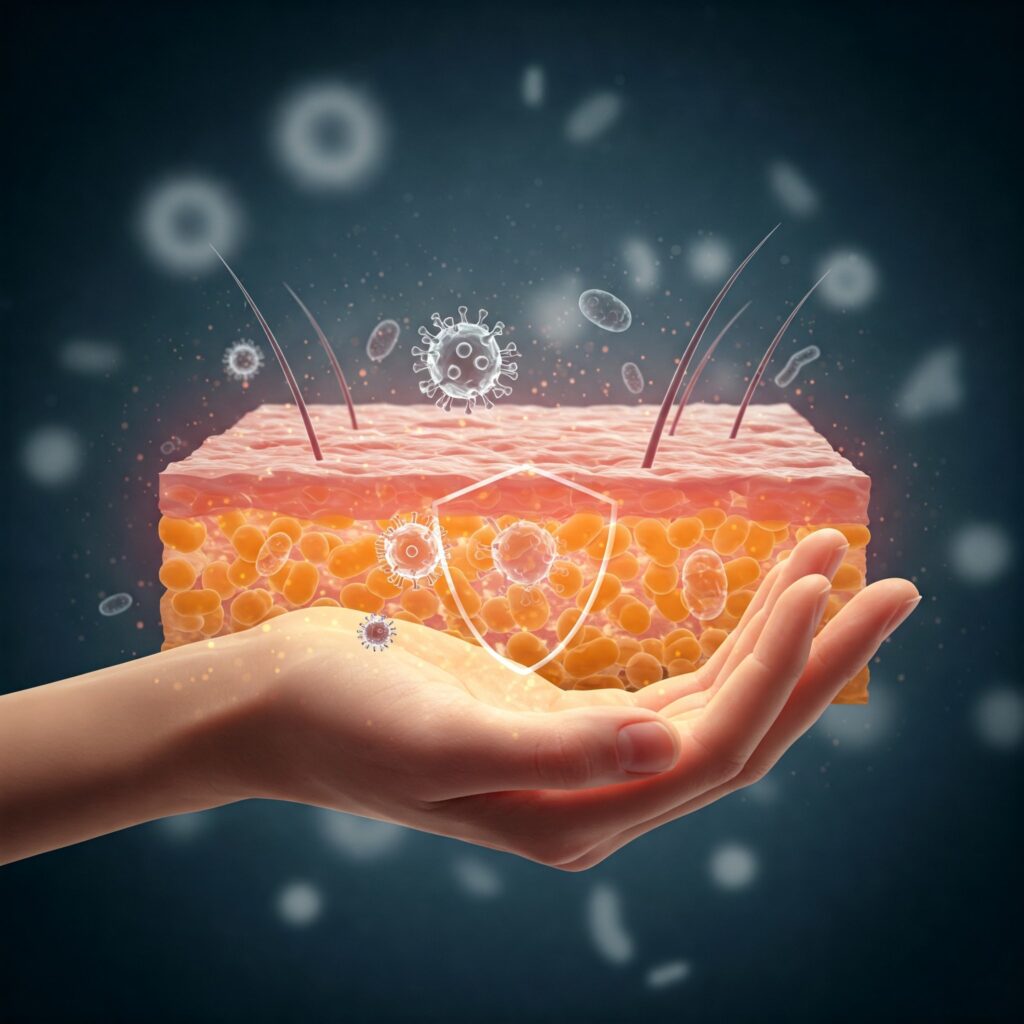
Introduction
Your skin is much more than just a protective barrier – it is a bustling ecosystem teeming with billions of tiny organisms. This diverse community, known as the skin microbiome, includes bacteria, fungi, viruses, and even microscopic mites that live both on the surface and within deeper layers of your skin. Far from being passive residents, these microorganisms play a vital role in protecting your skin, supporting your immune system, and maintaining overall skin health.
The skin microbiome acts as your body’s first line of defence against harmful pathogens, helping to keep your skin balanced, hydrated, and resilient. Understanding this invisible defence system is key to nurturing healthy skin and preventing common skin conditions.
What Is the Skin Microbiome?
The skin microbiome is a complex and dynamic ecosystem where multiple microorganisms coexist in harmony. Each person’s microbiome is unique, influenced by factors such as genetics, environment, age, and lifestyle.
Among the most common microbial residents are bacteria like Staphylococcus epidermidis and Cutibacterium acnes, fungi such as Malassezia species, various viruses, and tiny mites like Demodex. These organisms live in a state of symbiosis with your skin, meaning they benefit from your skin’s environment while providing essential protection in return.
This symbiotic relationship helps maintain the skin’s natural balance, preventing overgrowth of harmful microbes and supporting healthy skin function.
How the Skin Microbiome Protects You
The skin microbiome supports your immune system in several important ways:
- Producing antimicrobial peptides: Beneficial microbes generate substances that inhibit the growth of harmful pathogens, effectively acting as natural antibiotics on your skin.
- Regulating immune responses: The microbiome helps your skin distinguish between harmless and harmful stimuli, preventing unnecessary inflammation that can damage skin tissue.
- Facilitating wound healing: Certain microbes promote repair processes, helping the skin recover quickly from injury or irritation.
Your skin also has the remarkable ability to mount local immune responses independently, producing antibodies and other defence molecules right where they are needed. This local immunity is closely linked to the microbiome’s presence and activity.
Moreover, the microbiome plays a crucial role in maintaining the skin barrier’s integrity and homeostasis. By occupying ecological niches on the skin, these microbes prevent colonisation by dangerous pathogens. They also help regulate skin pH and hydration, ensuring your skin remains healthy and resilient.
The Microbiome’s Role in Skin Hydration and Balance
The skin microbiome plays a crucial role in maintaining skin hydration and overall balance. Commensal microbes interact closely with skin cells such as keratinocytes predominant cells in the outer skin layer-and sebaceous glands, which produce sebum, a natural oil.
Sebum provides lipids that serve as nutrients for certain beneficial microbes like Cutibacterium acnes. These microbes metabolise sebum components, producing substances that help regulate skin moisture and protect against harmful bacteria. Additionally, keratinocytes contribute to the skin’s water-impermeable barrier by forming tight junctions and releasing lipids, which work in harmony with the microbiome to prevent water loss.
A balanced microbiome also helps maintain the skin’s natural pH, typically slightly acidic, which is essential to inhibit the growth of pathogenic organisms. By supporting this delicate environment, the microbiome prevents both dryness and excess oiliness, promoting resilient, healthy skin with a smooth appearance.
Factors That Disrupt the Skin Microbiome
Several common factors can disrupt the delicate balance of the skin microbiome, a state known as dysbiosis. These include:
- Harsh cleansers and soaps that strip natural oils
- Overuse of antibiotics, which can kill beneficial microbes
- Environmental pollutants and UV exposure
- Excessive exfoliation or abrasive skincare routines
- Lifestyle factors such as poor diet, stress, and lack of sleep
When the microbiome is disturbed, it can lead to an overgrowth of harmful bacteria or fungi, contributing to skin conditions such as eczema, acne, rosacea, and psoriasis. Dysbiosis may also impair the skin barrier, making it more susceptible to irritation and infection.
Protecting and nurturing the skin microbiome is, therefore, essential for maintaining skin health and preventing these common disorders.
Supporting a Healthy Skin Microbiome
To support your skin’s natural ecosystem, consider incorporating microbiome-friendly skincare ingredients and habits into your routine:
- Prebiotics: Ingredients that nourish beneficial microbes, such as inulin and fructooligosaccharides.
- Probiotics: Live beneficial bacteria that can help restore microbiome balance.
- Postbiotics: Metabolic byproducts of probiotics that have skin-soothing and barrier-supporting effects.
- Barrier-repairing ingredients: Ceramides and niacinamide help strengthen the skin’s protective layer.
- Gentle cleansing: Use mild, ph-balanced cleansers to avoid disrupting natural oils and microbes.
- Avoid overuse of antibacterial products: These can indiscriminately kill both harmful and beneficial bacteria.
- Balanced diet and healthy lifestyle: Nutrient-rich foods, hydration, stress management, and adequate sleep support skin and microbiome health.
Personalised advice from a dermatologist can help tailor these strategies to your unique skin type and concerns, ensuring optimal microbiome balance and skin resilience.

Conclusion
The skin microbiome is a remarkable and complex invisible defence system that plays a vital role in maintaining your skin’s health. By protecting against harmful pathogens, regulating immune responses, and supporting the skin barrier, this diverse ecosystem of bacteria, fungi, viruses, and mites keeps your skin balanced, hydrated, and resilient.
Embracing microbiome-conscious skincare is essential for nurturing this natural defence and preventing common skin concerns such as dryness, inflammation, and sensitivity. Understanding how to support your skin’s microbial community empowers you to achieve healthier, more radiant skin.
Take the Next Step with the Skin Care Network
At the Skin Care Network, we are dedicated to advanced, microbiome-friendly dermatological care tailored to your unique skin needs. Our expert dermatologists combine the latest scientific insights with personalised treatments to help you maintain a healthy skin microbiome and address any skin concerns effectively.
Book a consultation today to discover how our specialist team can support your skin’s invisible defence system and guide you towards lasting skin health.
Visit us at skincarenetwork.co.uk or contact us to schedule your appointment at our North London clinic.



